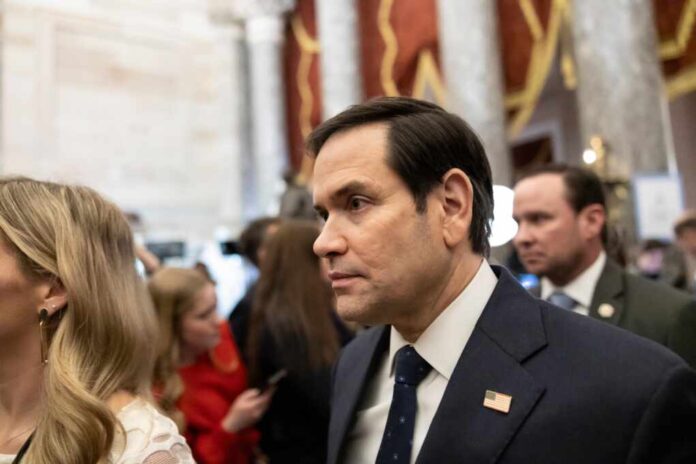
Secretary of State Marco Rubio delivers a stark ultimatum to Iran: halt uranium enrichment completely or face potential US military action as nuclear tensions continue to escalate.
At a Glance
- Rubio insists Iran must stop all uranium enrichment under any potential deal with the US
- Iran claims enrichment is its “non-negotiable right” while maintaining its nuclear program is peaceful
- US officials and Iranian counterparts are scheduled to meet in Oman for nuclear program talks
- The International Atomic Energy Agency reports Iran is accelerating uranium enrichment to 60% purity, approaching weapons-grade levels
- While offering a pathway to a civilian nuclear program, US threatens military force if Iran refuses to end enrichment
Rubio’s Hard Line on Iranian Nuclear Enrichment
Secretary of State Marco Rubio has established a clear position on Iran’s nuclear ambitions, stating that Tehran must cease all uranium enrichment activities as part of any potential agreement with the United States. Rubio outlined that Iran could still maintain a civilian nuclear program but would need to import enriched materials rather than producing them domestically. This stance represents a significant hardening of the US position as negotiations with Iran continue to develop under the Trump administration.
The position articulated by Rubio creates a direct confrontation with Tehran’s long-held stance on enrichment. A senior Iranian official responded to Rubio’s demands by declaring that “zero enrichment is unacceptable” and that the right to enrich uranium is “non-negotiable” for Iran. This fundamental disagreement presents a significant obstacle to reaching any diplomatic solution, as both sides appear unwilling to compromise on what each considers a core principle.
🇺🇸 TRUMP HOLDS SITUATION ROOM MEETING ON IRAN NUCLEAR DEAL
Trump gathered top national security officials — including Rubio, Vance, Hegseth, and Waltz — to prep for the next round of Iran nuclear talks.
Behind closed doors, the team debated whether to compromise or go full… https://t.co/YVsysSR5GN pic.twitter.com/FiWm20Wzba
— Mario Nawfal (@MarioNawfal) April 15, 2025
Military Action Looms as Diplomatic Option
President Donald Trump’s administration has made it clear that military options remain on the table if diplomatic efforts fail. The administration has already imposed substantial sanctions on Iran as part of its “maximum pressure” campaign and has indicated willingness to use force if Iran does not end its nuclear program. This approach reflects a consistent hardline position from the Trump administration, which has sought to counter what it perceives as Iranian regional aggression and nuclear ambitions.
US Middle East envoy Steve Witkoff reinforced Rubio’s position, initially stating that Iran does not need to enrich uranium past 3.67% for civilian purposes, before later emphasizing that Iran must stop and eliminate its nuclear enrichment entirely. The shifting language from US officials suggests internal discussions about how firmly to present demands to Iran while maintaining a united front in negotiations scheduled to take place in Oman.
SecState Rubio seems to endorse Witkoff's new position on Iran.
Last night, Witkoff said Iran could enrich up to 3.67%.
Now, Iran must "eliminate its nuclear enrichment" plus its "weaponization program." pic.twitter.com/OPFHDf6LQd
— Alex Ward (@alexbward) April 15, 2025
Evidence of Iran’s Advancing Nuclear Program
Recent reports from the International Atomic Energy Agency (IAEA) have heightened concerns about Iran’s nuclear activities. The agency has documented that Iran is accelerating uranium enrichment to 60% purity, which approaches the 90% threshold needed for weapons-grade material. This rapid advancement has alarmed Western nations, who argue that such high levels of enrichment far exceed what would be necessary for peaceful civilian purposes.
Iran continues to insist that its nuclear program is entirely peaceful and denies any intention to develop nuclear weapons. However, the technical reality that 60% enrichment represents a significant step toward weapons capability has made these claims increasingly difficult for Western powers to accept. The IAEA’s findings have strengthened the position of those who advocate for a harder line against Iran’s nuclear program.
Possible Pathway Forward
Despite the seemingly irreconcilable positions, Rubio did outline a potential pathway for Iran to maintain a civilian nuclear program. He explained that Iran could follow the model of other countries with civilian nuclear capabilities by importing necessary enriched materials rather than producing them domestically. This approach would allow Iran to generate nuclear power while eliminating the proliferation risk associated with enrichment activities.
The upcoming talks in Oman represent an opportunity for both sides to present their positions directly. While significant gaps remain, diplomatic channels remain open. The Trump administration’s willingness to engage in these discussions suggests a preference for resolving the situation without military conflict, despite maintaining that option as a last resort. Whether Iran will consider any compromise on what it views as its sovereign right to enrich uranium remains the central question facing negotiators.

























